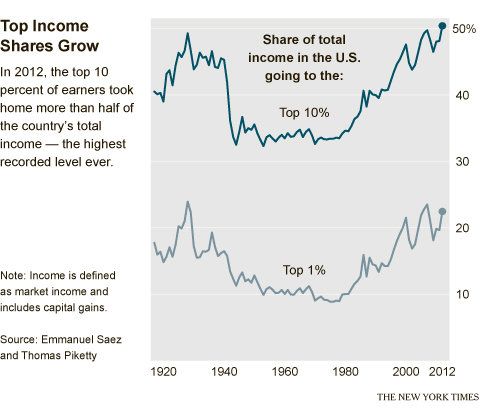“Punting the Pundits” is an Open Thread. It is a selection of editorials and opinions from around the news medium and the internet blogs. The intent is to provide a forum for your reactions and opinions, not just to the opinions presented, but to what ever you find important.
Thanks to ek hornbeck, click on the link and you can access all the past “Punting the Pundits”.
Follow us on Twitter @StarsHollowGzt
Paul Krugman: Paranoia of the Plutocrats
Rising inequality has obvious economic costs: stagnant wages despite rising productivity, rising debt that makes us more vulnerable to financial crisis. It also has big social and human costs. There is, for example, strong evidence that high inequality leads to worse health and higher mortality.
But there’s more. Extreme inequality, it turns out, creates a class of people who are alarmingly detached from reality – and simultaneously gives these people great power.
The example many are buzzing about right now is the billionaire investor Tom Perkins, a founding member of the venture capital firm Kleiner Perkins Caufield & Byers. In a letter to the editor of The Wall Street Journal, Mr. Perkins lamented public criticism of the “one percent” – and compared such criticism to Nazi attacks on the Jews, suggesting that we are on the road to another Kristallnacht. [..]
I also suspect that today’s Masters of the Universe are insecure about the nature of their success. We’re not talking captains of industry here, men who make stuff. We are, instead, talking about wheeler-dealers, men who push money around and get rich by skimming some off the top as it sloshes by. They may boast that they are job creators, the people who make the economy work, but are they really adding value? Many of us doubt it – and so, I suspect, do some of the wealthy themselves, a form of self-doubt that causes them to lash out even more furiously at their critics.
New York Times Editorial: A Formula for Repelling Women Voters
Republican leaders have chosen an odd way to try to win back female voters alienated by relentless G.O.P. attacks on women’s health care and freedoms. Instead of backing off, they’re digging in, clinging to an approach that gave President Obama a 12-point advantage among women in the 2012 election and provided the slim margin of victory for Terry McAuliffe, the Democratic candidate for governor in Virginia, in 2013. On the national level and even in some red states, the party’s stance on women’s rights is plainly not helping it.
Yet the ideological tide rolls on. States dominated by Republicans continue to enact new abortion restriction. The Republican National Committee last week heard Mike Huckabee, the former governor of Arkansas, suggest that Democrats favor universal access to free contraception because they think women “cannot control their libido” without the help of “Uncle Sugar.” And this week, the Republican-led House is expected to pass the deceptively named No Taxpayer Funding for Abortion Act.
President Obama’s State of the Union Address, according to briefings and leaks, will emphasize the president’s use of executive power to get the public’s business done despite a divided and severely deadlocked Congress.
That’s a good, overdue idea.
But the leaks do not mention one of the most important executive powers a president has to deal with a 30-year crisis of steadily declining living standards for most Americans. That is the president’s right to issue executive orders setting standards for federal contractors. As the union federation Change to Win has pointed out, government contractors create more low wage jobs than Walmart and McDonalds combined. [..]
President Obama has the power to make a practical difference in the lives of millions of workers and their families. He should declare bluntly that he aims to use that power, and dare Republicans to say that these workers are overpaid.
Richard (RJ) Eskow: They’re Fast-Tracking the Future, TPP Style – But We Can Stop Them
The “TPP,” or Trans-Pacific Partnership, is our nation’s newest proposed trade deal. It was negotiated without democratic input, and they’re trying to ram it through Congress the same way. Like NAFTA before it, the TPP would kill jobs. It would also cause lasting harm to democracy, here in the United States and around the world.
There has been an understandable sense of outrage over the Obama administration’s attempt to ram the most extreme trade deal yet through Congress with a “fast-track” provision that forbids amendments or filibustering. Representatives who have had very little chance to review the bill will be expected to vote on it without the chance to change it. [..]
Although these negotiators were appointed by Democrats, their positions don’t seem to differ from those taken by Republican Administrations. That reflects a political system which is increasingly being corrupted by campaign cash, and by the post-political work opportunities which American-run multinationals can offer sitting politicians.
It’s not unfair to say that the flaws in this treaty reflect the flaws in our democracy.
Harold Meyerson: Raising the Minimum is the Bare Minimum
In 1995, when John Sweeney ran the first and as-yet-only insurgent campaign for the presidency of the AFL-CIO, his platform took the form of a book entitled America Needs a Raise. If that title rang true in 1995, it clangs with deafening authority today.
Which leads us to the only problem with the current campaigns to raise the minimum wage: It’s not just workers at the low end of the wage scale who need a raise. It’s not just the work of the bottom 9 percent of labor force that is undervalued. It’s the work of the bottom 90 percent.
Conservatives who oppose raising the minimum wage argue that we need to address the decline of the family and the failure of the schools if we are to arrest the income decline at the bottom of the economic ladder. But how then to explain the income stagnation of those who are, say, on the 85th rung of a 100-rung ladder? How does the decline of the family explain why all gains in productivity now go to the richest 10 percent of Americans only? And are teachers unions really to blame for the fact that wages now constitute the lowest share of Gross Domestic Product since the government started measuring shares, and that corporate profits now constitute the highest share?
Frank Bruni: Fashion, Fairness and the Olympics
The February issue of Vogue, which will begin to show up on newsstands this week, includes details and a photo of something new from the celebrated fashion designer Alexander Wang, but it’s not quite like anything he’s done before, and it’s more than a piece of apparel. It’s a statement of solidarity, a cry of protest and a sign of just how many people from just how many walks of life are determined not to let the Olympics come and go without shining a light on Russia’s discrimination against, and persecution of, L.G.B.T. people.
It’s a winter hat, to be exact. A beanie, he calls it. Black. Warm. But the most important detail is this: It spells out P6, a shorthand for Principle 6 of the Olympic charter, and it speaks to a strategy by gay rights advocates-specifically, by the groups Athlete Ally and All Out-to get spectators and athletes in Sochi to register their opposition to outrageously repressive, regressive anti-gay laws in Russia without running afoul of one of them, which bans what it vaguely calls gay “propaganda,” or of the International Olympic Committee’s own restrictions against political statements.


 In January 2012 we defeated the SOPA and PIPA censorship legislation with the largest Internet protest in history. A year ago this month one of that movement’s leaders, Aaron Swartz, tragically passed away.
In January 2012 we defeated the SOPA and PIPA censorship legislation with the largest Internet protest in history. A year ago this month one of that movement’s leaders, Aaron Swartz, tragically passed away.
Recent Comments